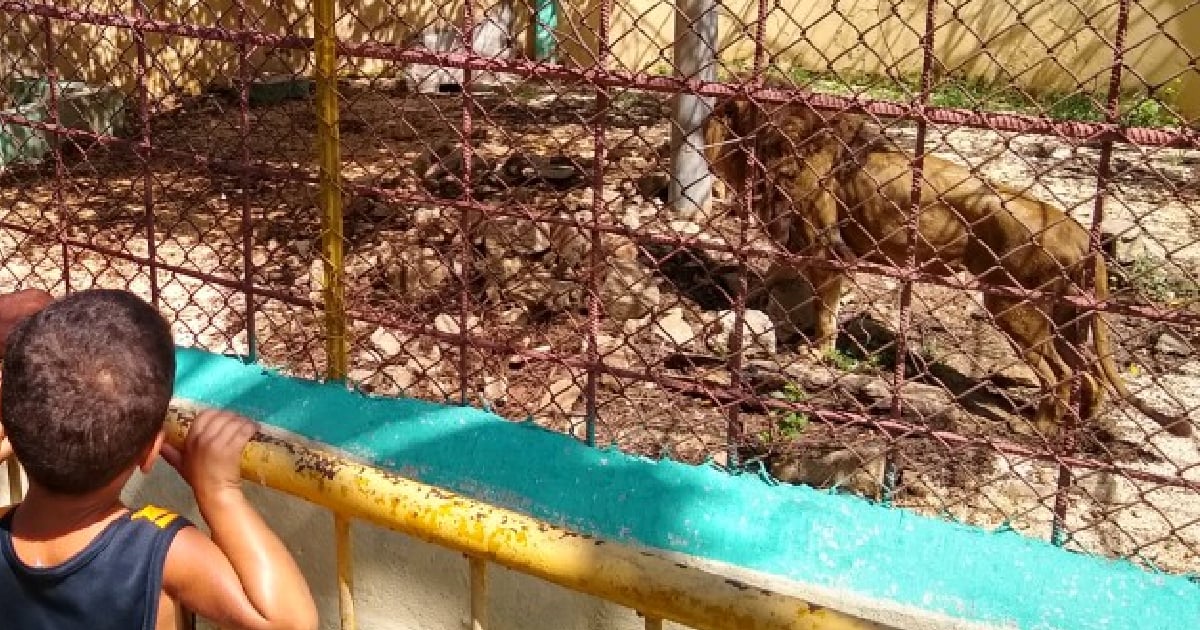
The animals at the Bartolomé Masó Zoo in Manzanillo, Granma province, are victims of the lack of food and show a critical state of extreme malnutrition and weakness.
A report by the independent newspaper 14ymedio revealed the calamitous conditions in which the lions, iguanas, monkeys, and other animals in the zoo are living, victims of the scarcity of suitable food for their respective diets, due to the acute economic crisis affecting Cuba, which has a greater impact on nutrition, both for citizens and animals.
Gerardo and Karen, the two lions in the park, are the most affected, as their diet should include "about 10 kilograms of meat, bones, offal, fish, chicken, and 'meat waste' daily," as their caregivers explained to the digital site.
However, that diet that was already difficult to maintain for years, now turns out to be "impossible", and the consequences are evident, as the felines have lost a considerable amount of weight, and "malnourished and lacking energy, spend the day curled up in a corner of their habitat."
The oldest of the lions, Gerardo, is nine years old, he was brought there from Kenya and is the father of Karen, also male, who was born in Cuba in 2019, after a cesarean section to the mother, who died shortly thereafter. The cub grew up without difficulties.
In 2023, the zoo directors boasted that he was taller and heavier than his father. 14ymedio quotes a journalistic work from the local radio station Radio Granma, last year, which published photos in which Karen sported a reddish mane and "her ribs were not visible, as they are now."
But the reality is different today. According to the digital newspaper, "the father is in a more critical condition. You can see his skeleton under the fur, which has lost color," while Karen "prefers to stay in her cell, also protecting herself from the sun," where "she huddles against the bars."
"They are not eating the same," said a veterinarian close to the zoo's administration to 14ymedio, identified as Enrique, who warned that "the feeding schedule for the lions is almost a military secret. Caretakers have precise instructions not to disclose anything about the feeding of the two lions."
The report from Radio Granma mentioned a year ago revealed that in the refrigerators of the facility, "the skeletons of cattle that the State destined for both felines" were hanging on hooks.
The park director, Caridad Jorge, then stated that, due to the impossibility of having all the necessary protein for the felines' diet on a daily basis, they traveled to other locations in the province to ensure it.
Concerned about the consequences of not providing the lions with an adequate diet, "rich in proteins and fats," Enrique warned that "malnutrition will have more serious results and will end in death" for both.
But Gerardo and Karen are not the only animals suffering from the lack of vital resources to sustain them.
The scenario described by 14ymedio is bleak: "The iguanas, barely distinguishable from the stones 'decorating' their moat, also try to escape the harsh sun of eastern Cuba. They have dry skin and avoid the pond, murky and full of debris. There are very few pigeons left, all caged. The one-handed monkey -introduced in Cuba in the 80s and characterized by its red face- has a snout of unhealthy pink and lowers its head."
Sebastián, a worker at the park for years, stated: "There is not enough money here to buy food for all the animals. The Meat Company cannot provide enough meat for the lions, that's why they are so skinny."
According to his testimony, a sporadic shipment of bones from the state entity arrives at the zoo. "We can only give them two meals a day, and sometimes there is only enough for one," he said.
The worker said that a few months ago the lions were worse off than they are now; in his opinion, both animals are "improving", despite their gaunt appearance, with ribs sticking out.
The problems of the zoo in the city of Manzanillo are not exclusive to that location. The terrible conditions in which animals survive in other parks of the same type in Cuba have raised alarms among animal protection activists and the general public.
It is not surprising then that some animals escape from zoos in search of food, as happened with a monkey from the Caibarién Zoo in Villa Clara the previous Monday. The monkey was finally captured, although not before managing to alleviate its hunger with food that it stole from houses in a neighborhood of the city.
Citizen complaints revealed last February the state of impoverishment of the animals at the Sancti Spiritus zoo, where they even suffer from a lack of water.
A YouTuber reported, in mid-2023, the shortage of water and food, and the mistreatment suffered by the animals at the 26th zoo in Havana.
Last June, 10 animals died at the Camagüey zoo, following the intense rains that flooded the city.
What do you think?
COMMENTFiled under: